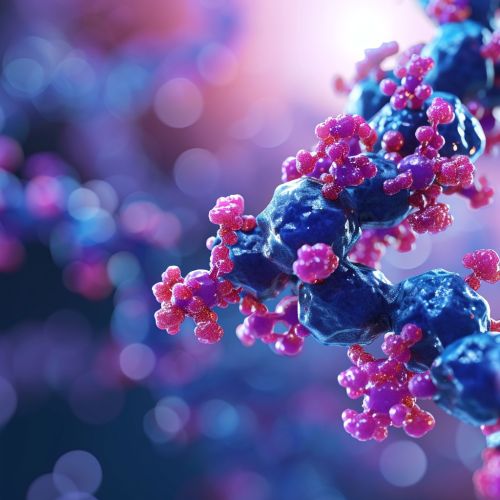Tyrosine kinase inhibitor
Introduction
Tyrosine kinase inhibitors (TKIs) are a class of pharmacological agents that act on enzymes known as tyrosine kinases. These enzymes play a crucial role in the signaling pathways that regulate cellular functions such as growth, differentiation, metabolism, and apoptosis. TKIs are used in the treatment of various types of cancer and other diseases.


Mechanism of Action
Tyrosine kinases are enzymes that transfer a phosphate group from ATP to the tyrosine residues of specific proteins inside a cell. This process, known as phosphorylation, is a common method of signal transduction in cells, leading to the activation or deactivation of certain cellular processes. TKIs inhibit this process, thereby disrupting the signaling pathways that drive the growth and proliferation of cancer cells.
There are two main types of tyrosine kinases: receptor tyrosine kinases (RTKs) and non-receptor tyrosine kinases (nRTKs). RTKs are located on the cell surface and are activated by the binding of specific ligands, such as growth factors. nRTKs, on the other hand, are located within the cell and are activated by other signaling proteins.
TKIs can be either selective, targeting a specific tyrosine kinase, or multi-targeted, inhibiting several tyrosine kinases simultaneously. The choice of TKI depends on the specific type of cancer and the genetic profile of the tumor.
Clinical Uses
TKIs have revolutionized the treatment of several types of cancer, including chronic myeloid leukemia (CML), gastrointestinal stromal tumors (GIST), and certain types of lung, breast, and kidney cancers. They are also being investigated for use in other types of cancer and diseases.
Chronic Myeloid Leukemia
Imatinib, a TKI that targets the BCR-ABL tyrosine kinase, has significantly improved the prognosis of patients with CML. Before the introduction of imatinib, the median survival for CML patients was about 5 years. With imatinib, the 10-year survival rate is now over 80%.
Gastrointestinal Stromal Tumors
GISTs are rare tumors that originate in the interstitial cells of Cajal in the gastrointestinal tract. These tumors often have mutations in the KIT or PDGFRA genes, which encode for receptor tyrosine kinases. TKIs such as imatinib and sunitinib have been shown to be effective in the treatment of GISTs.
Lung Cancer
In non-small cell lung cancer (NSCLC), mutations in the EGFR gene, which encodes for an epidermal growth factor receptor, are common. TKIs such as erlotinib and gefitinib, which target the EGFR tyrosine kinase, have been shown to improve survival in NSCLC patients with these mutations.
Side Effects and Resistance
Like all drugs, TKIs can have side effects. These can include fatigue, nausea, diarrhea, skin rashes, and liver toxicity. More serious side effects, such as heart failure and pulmonary hypertension, can also occur, although they are less common.
Resistance to TKIs is a major challenge in their use. This can occur through several mechanisms, including mutations in the target kinase, activation of alternative signaling pathways, and drug efflux by ABC transporters. Strategies to overcome TKI resistance include the development of second- and third-generation TKIs, combination therapy with other drugs, and the use of TKIs as adjuvant therapy.
Future Directions
Research into TKIs is ongoing, with many new drugs in development. These include TKIs that target novel kinases, as well as drugs that are designed to overcome resistance to current TKIs. In addition, research is being conducted into the use of TKIs in combination with other treatments, such as immunotherapy and targeted radionuclide therapy.
